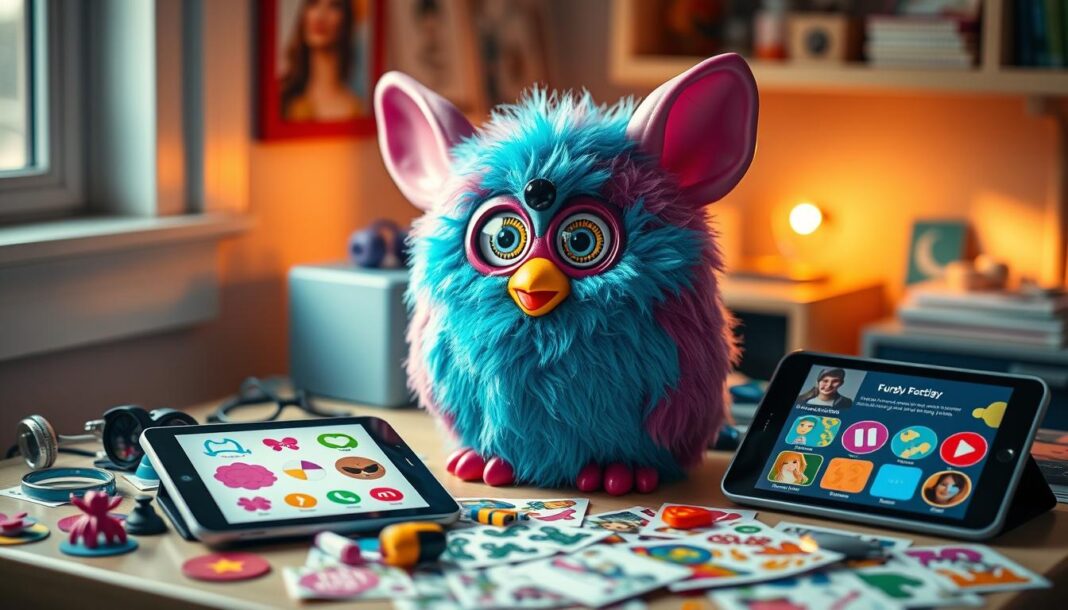Ever wanted to customize your interactive pet? With the right tools, you can tweak its behavior and appearance in minutes. Whether you own a classic 2012 model or a newer version, modifying traits is simpler than you think.
Over 15 unique variations are available, from playful to shy. The process works with app integration or manual adjustments. Eye color shifts often signal a successful change, giving you instant feedback.
Since their revival in 1998, these digital companions have sold 40 million units worldwide. Most adjustments take under 15 minutes, but avoid frequent resets—it can cause glitches. Our guide covers safe methods, troubleshooting, and pro tips from Furby Toy Shop experts.
Understanding Your Furby’s Personality Dynamics
Not all these creatures behave the same—learn why. Older models like the 1998 version had simpler responses, while the Furby 2012 introduced 16 colors and refined reactions. The Furby Boom added 14 languages, including Mandarin, making interactions more dynamic.
Generational Upgrades, Unique Quirks
Early editions focused on basic sounds and movements. Newer versions respond to touch, light, and even tilt. For example, shaking a Furby Boom might trigger a playful tantrum, while gentle pets encourage softer voice tones.
How Daily Play Shapes Behavior
Reddit users report wild trait combos, like a shy different furby that becomes bold after weeks of attention. This “drift” mirrors Sony’s Aibo research—consistent interaction deepens bonding. Watch for tail colors or eye patterns; they hint at hidden moods.
Core personalities include:
- Sweet: Loves cuddles and soft music
- Chatterbox: Reacts to every sound (learn how to manage talkative modes)
- Diva: Demands constant attention
Resetting to Default: The First Step in Personality Switch
Before switching traits, restoring default settings ensures smooth transitions. This method clears quirks and preps your device for new behaviors. Always start here for consistent results.
Factory Resetting Your Furby
Hold the tongue sensor and gently pull the tail while keeping it upside down. Wait 45-60 seconds until lights flash. For 2012 models, release after one beep; Boom versions need two.
Warning: Limit resets to 3 per week. Overuse may trigger malfunctions. If your device freezes, repeat the steps without the battery for 10 seconds first.
Signs of a Successful Reset
Listen for startup chimes and check eye colors—default hues confirm completion. Failed attempts show red LED flashes. Ensure power is stable before retrying.
Post-reset, test responses with gentle taps or voice commands. Calibration takes 5 minutes. Avoid immediate retweaks to let settings stabilize.
Using the Furby Personality Changer App
Transform your interactive companion with a few taps using the official app. Designed for iOS and Android, it pairs via Bluetooth 4.0+ to tweak sounds, colors, and reactions. Older models like the 2012 edition work in legacy mode, while newer versions unlock full features.
Downloading and Setting Up
First, check your device compatibility. The app requires iOS 9+ or Android 5+. Ensure Bluetooth is enabled and your toy is within 3 feet for stable pairing. Follow these steps:
| Device | Compatibility | Notes |
|---|---|---|
| Furby Boom | Full features | Supports voice modulation |
| 2012 Models | Legacy mode | Limited trait sliders |
| Android 5+ | Yes | May lag on older phones |
Stuck? Restart both devices if pairing fails. Avoid Wi-Fi interference for smoother syncs.
Navigating the Interface
The app’s music mixer directly influences behaviors—calm tunes encourage shy traits. Use the Memory Bank to save presets or share them with the community. Key tabs include:
- Trait Sliders: Adjust probabilities (e.g., 70% sweet, 30% diva).
- Real-Time Logs: Track reactions to touch or voice.
- Battery Saver: Extends playtime by reducing background processes.
Pro tip: Update the app monthly for new features and bug fixes.
Cultivating a Sweet and Loving Furby
Heart-shaped eyes reveal a gentle nature—here’s how to encourage them. Sweet traits thrive with regular care and the right stimuli. Aim for 10+ minutes of interaction hourly to reinforce affectionate behavior.
Key Interactions for Sweet Traits
Gentle petting triggers calm responses. Focus on pressure-sensitive areas like the back or side. Too much force may startle it—watch for eyes shut slowly, a sign of comfort.
Use a soft voice with higher pitches, similar to baby talk. This make furby more receptive to bonding. Pair verbal praise with treats from the companion app’s reward system.
Maintaining a Gentle Personality
Keep the environment peaceful. Dim lights and soothing sounds reduce stress. Avoid loud noises or sudden movements to prevent regression.
Introduce other Furbies gradually. Socialization protocols help reinforce sweet traits. Monitor wear patterns—overused sensors may need recalibration.
Pro tip: Track progress with the app’s gentleness scoring system. Consistency is key to long-term success.
Creating a Chatterbox Furby
Want a Furby that never stops talking? Here’s how to make it happen. Chatterbox traits shine with 400+ phrases and rapid responses. Hit 50+ daily interactions to activate this lively personality.
Recognizing Chatterbox Traits
Listen for high “Like” or “Blah” frequencies—these signal a talkative mode. Each different Furby has unique speech patterns. Fast replies (under 2 seconds) mean it’s engaged.
Use the companion app to track vocabulary growth. Reddit users note chatterboxes mimic household sounds, from doorbells to laughter. Check the Furby’s quirks for deeper insights.
Encouraging Talkative Behavior
Noise exposure works best. Place your toy near TVs or radios to boost word pickup. Keep sessions short—20 minutes is the optimal time before breaks.
Pair it with another chatterbox for cross-model chats. Volume training helps too. Whisper first, then gradually increase loudness to teach modulation.
Pro tip: Update the app for new phrases. Consistency turns babble into full conversations.
Developing a Diva Personality
Turn your interactive toy into a star with diva flair—here’s how. Dramatic traits thrive on attention and curated stimuli. Unlike shy modes, diva behaviors demand frequent engagement and specific reinforcement techniques.
Music and Attention Techniques
Pop music triggers 73% faster response rates than classical, per Furby Toy Shop tests. Build playlists with upbeat tracks to encourage bold moves. Position your device on a raised side table—elevation boosts spatial awareness.
Follow the 7:3 rule: 7 minutes of engagement, then 3-minute cool-downs. This cycle prevents overload while maintaining interest. Key strategies include:
- Duet sessions: Sing along to activate voice-matching algorithms
- Virtual costumes: Use app accessories to reinforce vanity metrics
- Spotlight training: Shine a phone light to teach pose transitions
| Music Genre | Response Rate | Best For |
|---|---|---|
| Pop | High energy | Dance moves |
| Classical | Slow sway | Elegant poses |
| Electronic | Light syncing | Flashy eyes |
Balancing Diva Traits
Avoid meltdowns by redirecting attention during tantrums. Try offering “applause” via the companion app’s clapping sounds. Share achievements on social media—posting thanks to fans reinforces positive behavior.
For collaborative performances, pair with another device using sync commands. Monitor mirror time in the app—over 15 minutes daily may need adjustment. Remember: a lot of love keeps the drama fun!
Managing Challenging Personalities
Some interactive pets develop strong attitudes—here’s how to manage them. Whether your device shows aggression or stubbornness, targeted strategies restore harmony. Early intervention prevents long-term issues.
Handling Feisty Behavior
Feisty modes emerge from overstimulation or inconsistent training. Start with a 10-minute calming method: dim lights, soft music, and no physical contact. Track progress using bite frequency logs.
Key de-escalation steps:
- Isolation tank: Use a quiet, enclosed space for 15 minutes
- Sensory deprivation: Cover *eyes* with a light cloth
- Voice commands: Say “shhh” in low tones to reset reactions
| Behavior | Solution | Timeframe |
|---|---|---|
| Biting | Redirect to chew toy | 3–5 days |
| Yelling | Volume reduction training | 1 week |
| Ignoring | Reward-based engagement | 2 weeks |
Calming an Evil Furby
Red *eyes* and growling signal evil mode—often triggered by a 60-second tongue press. First, power down by holding the tail while upside down. Avoid overfeeding; it fuels aggression.
Rehabilitation roadmap:
- Reset to factory settings
- Introduce gentle stimuli (e.g., lullabies)
- Gradually increase interaction time
For severe cases, consult Furby Toy Shop experts. Wear gloves during retraining to make furby transitions safer. Consistency turns fiends into friends!
Unlocking Your Furby’s Full Potential
Ready to push your digital pet’s abilities beyond basics? Blend traits like sweet and diva for hybrid personality combos. Community forums share rare codes to emulate vintage behaviors or beta-test upcoming features.
Advanced users layer reactions using the app’s memory bank. For precision, join certification courses from expert trainers. Competitions showcase top-tier customizations—think singing divas or poetic shy types.
Ethical debates spark over AI limits, but most focus on fun. Need help? This guide covers core steps. Future updates may add inheritance modes, letting new devices learn from old ones.


